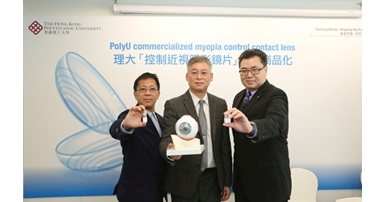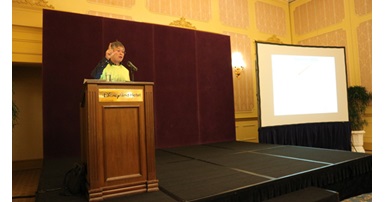Commercialization of research results: PolyU turns novel myopia control contact lens to product
The optometry research team led by Professor To Chi-ho, Head of the School of Optometry at The Hong Kong Polytechnic University (PolyU), and Professor Carly Lam from the same School, developed the novel Defocus Incorporated Soft Contact (DISC) lens for myopia control in children. PolyU entered into a licensing arrangement with Vision Science and Technology Co. Ltd. (VST), a local start-up supported by HKSTP-PolyU Tech Incubation Fund (TIF) and PolyU Tech Launchpad Fund (TLF), for commercializing DISC lens. The arrangement exemplifies successful commercialization and transfer of PolyU technology facilitated by entrepreneurship efforts.
The award-winning DISC lens brought new hope to the myopic population. The lens is a multi-zone soft contact lens which provides clear vision and at the same time projects blurred, out-of-focus (defocused) images onto the retina to slow down excessive eye growth in myopia.
Myopia (or short-sightedness) is a major cause of ocular morbidity for school children, especially among ethnic Chinese. When a child has myopia, the light that enters the eye focuses in front of the retina rather than on it. The new method involves producing a clear image on the retina and another defocused or blurred image in front of the retina. In doing so, the DISC lens makes use of the natural homeostatic mechanism known as ‘emmetropization’, whereby the eye tends toward a size that allows it to receive focused images as it would do with normal vision, i.e. eye growth is regulated by optical inputs from the environment. The lens improves the wearer’s vision and provides constant myopic defocus (“STOP” signal to myopia) at all viewing distances.
Spanning two years with a sample of 128 subjects, the clinical control trial showed that DISC lens retarded the progression of myopia by approximately 60% in Hong Kong school children aged 8 to 13. More importantly, the children found the lens comfortable to wear. The new lens also provided clarity that was comparable to conventional single vision lens, which deliver the same optical focal point over their entire area. This technology was patented in Australia, the Chinese mainland, the US and various European countries.
Professor To explained, “Since the DISC lens takes advantage of the natural homeostasis of the eye, the wearer can avoid suffering from the adverse effects of drug or surgery. Moreover, the functional element, optical defocus, can be incorporated into widely accepted forms of contact lens to provide clear and comfortable vision while myopia is being controlled.” It opens up a new opportunity for treating other refractive errors, such as hyperopia, using suitable defocus. Besides Hong Kong, this technology is highly relevant to many Asian regions, including Singapore, Taiwan, and the Chinese mainland, where myopia prevalence is high.
“I am glad that after years of hard work, the research on DISC lens eventually bears fruit through successful commercialization, benefiting children in need with real products,” added Professor To.
VST, the licensee of the DISC lens for myopia control, is a local company founded by Mr Jackson Leung Tse-man, a PolyU alumnus. Specializing in developing and distributing products for vision improvement, it is the first company in Hong Kong which adopts a tailor-made professional fitting approach to manufacture and provide soft myopic control lenses. The lenses are manufactured according to the prescription of the optometrists to ensure they match the needs of individual customer.
VST manufactures DISC lenses using silicon hydrogel, a highly oxygen permeable material approved by the US Food and Drug Administration. It is also one of the most oxygen permeable materials for contact lenses. Under the commercialization arrangement, VST manufactures and provides DISC lenses via a network of optometric clinics, which are recruited as the company’s authorized fitting centres.
PolyU also prescribes DISC lens at its Optometry Clinic and will provide training for optometrists in fitting the DISC lens on the eyes.
“As an optometrist graduate of PolyU, I see good potential in this advanced myopia control method and am impressed by its exceptional result in the clinical trial. The success of commercialization also has to do with PolyU’s unreserved support for start-up companies. The licensing arrangement signifies PolyU’s remarkable achievement in technology transfer and commercialization of the University’s technology through entrepreneurship development,” said Mr Leung, Founder and Director of VST.
VST was awarded a total of HK$1.6 million, including a matching fund, under TIF and TLF schemes with funding support from the Technology Start-up Support Scheme for Universities under the Innovation and Technology Commission of the Hong Kong SAR Government, and aims to increase the number of authorized fitting centres so that the technology can benefit a wider community.
PolyU has long been keen in nurturing the entrepreneurial culture and in providing support to aspiring entrepreneurs. One major way of support is the offer of various seed funds, which are monetary grants awarded to start-ups with no strings attached. The University also provides co-working space for entrepreneurs at PolyU InnoHub, mentorship support through the Startup Consultation Clinic manned by Entrepreneurs-in-Residence, practical training workshops, and opportunities to network with incubators and investors.





